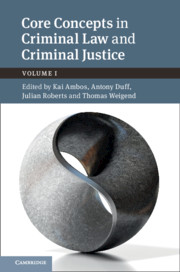Book contents
- Core Concepts in Criminal Law and Criminal Justice
- Core Concepts in Criminal Law and Criminal Justice
- Copyright page
- Contents
- Preface
- Abbreviations
- Contributors
- Part I Introduction
- Part II Criminal Law
- 2 Omissions
- 3 Preparatory Offences
- 4 Participation in Crime
- 5 Consent in the Law Relating to Sexual Offences
- 6 Terrorism Offences
- Part III Criminal Justice and Procedure
- Index
- References
5 - Consent in the Law Relating to Sexual Offences
from Part II - Criminal Law
Published online by Cambridge University Press: 19 December 2019
- Core Concepts in Criminal Law and Criminal Justice
- Core Concepts in Criminal Law and Criminal Justice
- Copyright page
- Contents
- Preface
- Abbreviations
- Contributors
- Part I Introduction
- Part II Criminal Law
- 2 Omissions
- 3 Preparatory Offences
- 4 Participation in Crime
- 5 Consent in the Law Relating to Sexual Offences
- 6 Terrorism Offences
- Part III Criminal Justice and Procedure
- Index
- References
Summary
It seems obvious that the presence or absence of consent can make all the difference between, on the one hand, a meaningful and loving sexual act between two people and, on the other, a serious violation of the human dignity and personal autonomy of one of those people. Yet, there is a surprising degree of uncertainty as to the precise circumstances in which a person can genuinely be treated as consenting. This is scarcely a satisfactory state of affairs in an era where there is a growing and welcome emphasis internationally on the importance of the right to sexual autonomy. The comparative analysis we undertake in this chapter will reveal parallels between the British and Irish jurisdictions and Germany insofar as the meaning and scope of consent are concerned. It will also show that certain situations are evaluated quite differently, with the English-speaking jurisdictions tending to be more restrictive when it comes to accepting the presence of valid consent. Recent developments in German criminal law may, however, point in the direction of a rapprochement between the two sets of jurisdictions. It may well be that global tendencies toward stronger protection of the interests of women in particular overshadow the formerly more ‘liberal’ instincts of German law.
- Type
- Chapter
- Information
- Core Concepts in Criminal Law and Criminal Justice , pp. 135 - 171Publisher: Cambridge University PressPrint publication year: 2020
References
- 1
- Cited by



